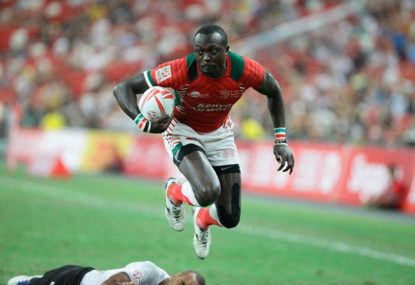Manu excited to take SBW path in pursuit of All Blacks goal but admits 'I've got to learn the game' first
Joey Manu insists an All Blacks cap remains a distant goal, even if his impending switch to the 15-player game has experts excited about…

Collins Injera is the leading try scorer in the history of the World Rugby Sevens series. The affable and athletic Kenyan has crossed the chalk 237 times in 67 tournaments, making him one of the most universally respected players on the circuit and a genuine identity in international rugby.
“It’s a lot of tries which shows how far I have come as an individual. The one try that really stands out is the one I scored against South Africa in Wellington when we beat them for the first time,” Injera recalls.
Injera started playing rugby in 2001, picking up a ball at college for the first time when he was 15 years old, and debuting at the Hong Kong Sevens in 2006.
Since his first taste, rugby has come a long way in Kenya.
“Rugby has been introduced into the school curriculum which is increasing the numbers and exposure of the sport. Boys are picking up the ball for the first time when they are nine or ten years of age instead of 15,” Injera explains.
Kenya has competed in 119 World Series events and their results have improved markedly.
At the 1998 Kuala Lumpur Commonwealth Games, Kenya was thrashed 71-0 by Fiji. Eleven years down the line, Kenya beat Fiji at the 2009 Rugby World Cup Sevens.
In 2016, the African nation went one better and beat Fiji 30-7 in the final of the Singapore Sevens to win their maiden World Series event, having been runners up in Wellington in 2013 and Adelaide in 2009.
“Singapore was a special tournament for us,” Injera reflects. “It was our first win and it was a big deal in Kenya. There was a parade for the team and it put some pressure on us to perform in future tournaments.”
Injera scored twice in the final and was named player of the tournament. Ironically though, a 40-metre penalty drop-goal in the semi-final was perhaps his most brilliant moment.
Kenya had only scraped through to the knockout stages after beating Russia, drawing with Scotland and losing to South Africa. In the quarter-finals they accounted for France 28-7, before facing Argentina in the last four. At the end of regulation time it was 12-12. Injera describes what happened next:
“We had scored in the dying moments to tie the scores. I missed a relatively easy conversion and the game went to extra time. We won a penalty and I decided to shot for goal. If I had missed it wouldn’t have mattered. We would have kept on going. I put my head down, followed through and fortunately I kicked it. It was a spectacular moment.”
Kenya are capable of playing spectacular rugby. Present squad members Billy Odhiambo, Willy Ambaka and Nelson Oyoo are among the most exciting players on the tour, and Injera has a theory as to why his side are such popular tourists.
“I think it’s the brand of rugby we play. We like to play an up tempo style and enjoy expressing ourselves,” he says.
Injera identifies New Zealand’s Frank Halai and Samoa’s Alafoti Faosiliva as the toughest opponents he has confronted in Sevens. Both at the best were “unstoppable” because of their “power” and “speed.”
An even bigger challenge for Injera is balancing the demands of sevens with his full-time job. Kenya’s players are only semi-professional and Injera works in PR for Advanced Medical Solutions, a company that sells medical equipment.
“It’s a tricky balancing act, but after a while it becomes relatively easy and you can’t really complain, can you,” Injera concludes.